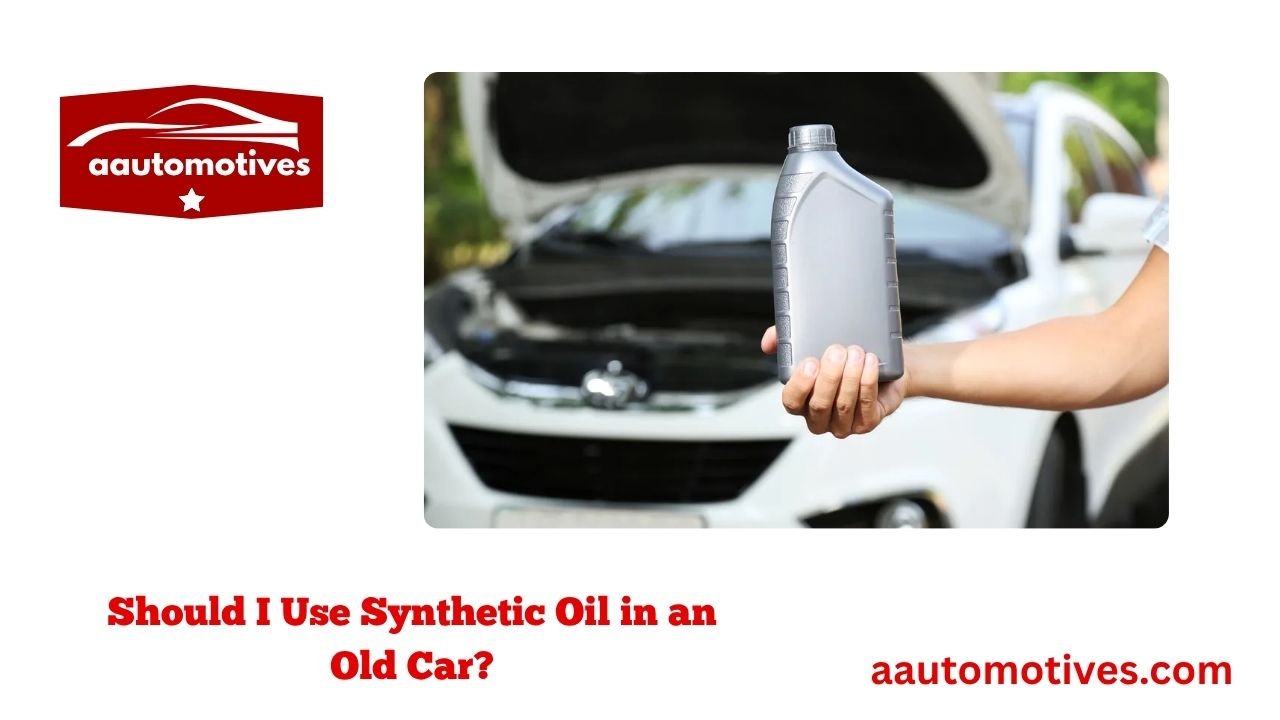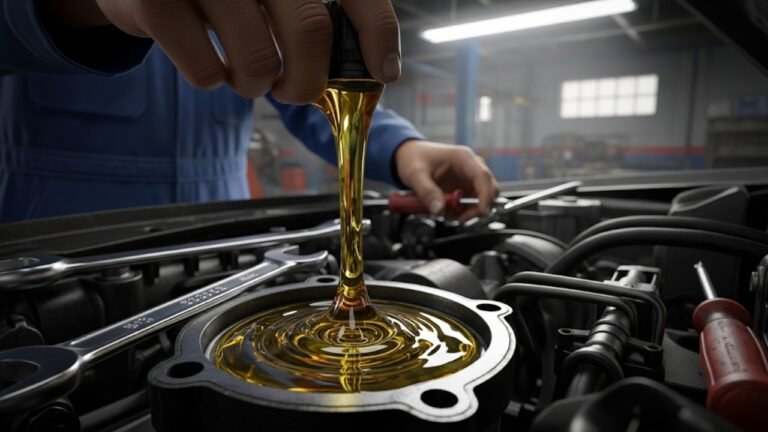Should I Use Synthetic Oil in an Old Car?

You’ve probably stood there, oil cap in one hand, synthetic bottle in the other, wondering, “Should I use synthetic oil in an old car?” It’s a fair question—and one I’ve asked myself too. I remember staring at my dad’s ‘96 Corolla, trying to do right by it without overdoing it. It felt like walking a tightrope between care and overkill.
Back then, cars didn’t need fancy oils. But times have changed. Technology has grown, engines are more complex, and even oil isn’t just oil anymore. Now, you’ve got synthetic, conventional, semi-synthetic, and everything in between. For old engines, that can feel overwhelming.
But here’s the deal: your car deserves the best care, no matter how many birthdays it’s had. And choosing the right oil—especially synthetic oil in an old car—might be the most important decision for its second life.
Let’s walk through it like friends swapping car stories over coffee. I’ll bring the facts, the feelings, and a little personal intuition to help you decide.
What Is Synthetic Oil, Really?

At first glance, synthetic oil might seem like just a marketing gimmick. It’s oil, right? But here’s what makes it special:
-
It’s man-made using chemically modified components.
-
It starts from a base oil but is purified and broken down on a molecular level.
-
The result? More uniform molecules, better performance, and fewer impurities.
Think of conventional oil like raw milk—natural, but inconsistent. Synthetic oil? That’s your ultra-filtered almond milk latte. It’s smoother, cleaner, and flows better under extreme temperatures.
In simple terms: synthetic oil is engineered for modern engines but might just be a secret savior for old ones too.
What Happens Inside an Old Engine?
An old engine has history. It’s been through summer heatwaves, winter starts, traffic jams, and maybe even the occasional burnout. Its parts aren’t as tight, and seals may be a little worn. It’s like an athlete in their 50s—still capable, but it needs different care.
Here’s what typically goes on:
-
Increased sludge and deposits from years of oil breakdown.
-
Worn piston rings can cause oil to seep into the combustion chamber.
-
Old seals may shrink, causing leaks.
-
The engine may run hotter due to less efficiency.
Because of these factors, some people fear switching to synthetic oil. They believe it might leak more, clean too aggressively, or even cause damage. But are those concerns valid? Let’s break it down.
The Great Debate: Will Synthetic Oil Harm My Old Car?
Let’s address the elephant in the garage.
“I heard synthetic oil causes leaks in old engines.”
You’ve heard it. I’ve heard it. Even the guy at the corner oil change shop probably believes it. But here’s the truth:
Synthetic oil doesn’t cause leaks.
It may, however, reveal leaks that were already there.
Because it flows better and cleans more efficiently, synthetic oil might find cracks and weak spots that conventional oil couldn’t reach. So when people say synthetic oil “caused” a leak, it really just exposed the truth.
And that’s not a bad thing. Would you rather patch a slow leak now or rebuild the engine later?
Benefits of Synthetic Oil in an Old Car: More Than You Think
If you’re still wondering, should I use synthetic oil in an old car, take a moment to consider these legit benefits:
Better Temperature Stability
Old engines can run hot. Synthetic oil resists breaking down under heat. That’s vital for old cooling systems that might not be as efficient anymore.
Superior Lubrication
Synthetic oil keeps things moving. It reduces friction, even in older, looser parts. That means less wear and smoother performance.
Cleaner Engine
Over time, gunk builds up. Synthetic oil cleans old sludge gently. It keeps the engine’s insides fresh and breathing easier.
Improved Fuel Economy
Less friction = less drag = better mileage. Even in older engines, synthetic oil can shave a bit off your fuel costs.
A Personal Story: What Happened When I Switched
I used to drive a 2001 Honda Accord—nicknamed “Sandy.” She had over 230,000 miles when I first considered switching to synthetic. I hesitated, thinking the myths might be true. But curiosity won.
I started with a high-mileage synthetic blend, just to be safe. I watched her like a hawk. No leaks. No strange noises. If anything, she felt smoother.
Three oil changes later, I went full synthetic. Sandy ran cooler, stopped burning oil, and even picked up a little extra pep in her step. She cruised to 275,000 miles before I passed her on to a college student who still sends me updates.
Would I do it again? In a heartbeat.
Types of Synthetic Oil for Old Cars
There’s more than one kind of synthetic oil. And for older engines, choosing the right one matters. Here’s a table to help:
| Oil Type | Best For | Why It Works |
|---|---|---|
| Full Synthetic | Modernized old engines, clean seals | Maximum protection, high performance |
| Synthetic Blend | First-time switchers or uncertain engines | A mix of conventional and synthetic for balance |
| High-Mileage Synthetic | Cars with 75K+ miles and wear-prone seals | Extra detergents, seal conditioners |
So, if you’re still on the fence about using synthetic oil in an old car, go with a high-mileage synthetic to ease the transition.
How to Make the Switch Safely
You shouldn’t just dump synthetic oil into an old engine and call it a day. There’s a better way to do it—step by step:
1. Check for Existing Leaks
Inspect your engine seals and gaskets. If it’s already leaking, address that first.
2. Start with a Synthetic Blend
Give your engine time to adjust. Use a blend for 1–2 oil changes.
3. Use a High-Quality Oil Filter
A synthetic oil filter is more efficient. It traps smaller particles and works better with thinner oils.
4. Change More Frequently at First
Let the synthetic clean your engine, then drain out the gunk. Change after 3,000–4,000 miles for the first few cycles.
5. Monitor Oil Consumption
Check dipsticks regularly. Old engines might burn more oil initially.
Listening to Your Engine: Signs It’s Ready for Synthetic
Old cars speak in subtle ways—rattles, purrs, grumbles. After spending years behind the wheel of older vehicles, I’ve learned that listening closely matters. Switching to synthetic oil in an old car isn’t just about upgrading—it’s about knowing your engine is ready.
Here are some signs your old engine may benefit from synthetic oil:
-
Increased engine noise: If your car sounds rough on cold starts, synthetic can reduce metal-on-metal friction.
-
High mileage: Once you’re over 75,000 miles, high-mileage synthetic formulas help nourish worn seals.
-
Burning oil smell: This can mean the engine is running hot or oil is burning off too fast—synthetic resists that better.
-
Frequent sludge in the oil: If you find black, goopy sludge during oil changes, synthetic can help clean that up.
I had an old Mazda pickup with 190,000 miles that started sounding louder in winter. I switched to synthetic, and the morning grind all but vanished. It was like the engine sighed in relief.
Addressing Common Myths About Synthetic Oil in Older Engines
We all know the internet can be a confusing place. You search “should I use synthetic oil in an old car”, and suddenly you’re neck-deep in forums, myths, and contradicting advice. Let’s clear the air.
Myth 1: Synthetic Oil Causes Leaks
Truth: Synthetic oil may expose existing leaks, but it doesn’t cause them. If your engine’s in good shape, you’re fine.
Myth 2: It’s Too Thin for Old Engines
Truth: Synthetic oil comes in various viscosities. You can still use 10W-40 or 15W-50 in synthetic form.
Myth 3: You Can’t Switch Back
Truth: You can move between synthetic and conventional oils. Just avoid mixing the two directly.
Myth 4: It’s Not Worth It for Old Cars
Truth: If anything, it might be more valuable. Older engines benefit from the added protection, cleanliness, and heat resistance.
Remember: myths stick around because they feel true—but that doesn’t mean they are. Stick to science and real-world experience.
High-Mileage Engines and Synthetic Oil: The Perfect Pair?
Old doesn’t mean broken. High mileage doesn’t mean done. And when you match the right oil to your car’s needs, magic can happen.
High-mileage synthetic oils are designed with these specific features:
-
Seal conditioners to soften brittle gaskets
-
Extra detergents to clean decades of build-up
-
Thicker base oils to compensate for engine wear
I used Valvoline High Mileage Synthetic on my old Saturn, and after just two oil changes, it stopped burning oil entirely. No more top-offs. No more oil light surprises. Just smooth, consistent performance.
So yes—if your engine has stories to tell and a few war wounds, a high-mileage synthetic oil might be exactly what it needs to keep on rolling.
When You Might Want to Stick With Conventional Oil
Let’s be honest. Synthetic oil isn’t always the answer. Here are some moments where you might want to hold off:
Severe Oil Leaks
If your car is leaking badly already, synthetic oil’s smaller molecules might escape faster. Fix the leak first.
Recent Repairs or Overhauls
Engines that have just been rebuilt need break-in periods. During this time, many mechanics recommend using conventional oil until seals are seated.
Budget Constraints
Synthetic oil is more expensive. If you’re doing frequent changes due to oil burning or leaks, sticking with conventional until issues are fixed may be smarter.
But remember, even in these cases, a synthetic blend can offer a middle ground—more protection than conventional, without the full cost.
Quick Comparison: Conventional vs. Synthetic for Older Engines
Here’s a table that compares how each oil performs in key areas related to older vehicles:
| Feature | Conventional Oil | Synthetic Oil |
|---|---|---|
| Flow in Cold Weather | Moderate | Excellent |
| Protection Against Wear | Basic | Advanced |
| Cleaning Ability | Limited | High |
| Cost | Lower | Higher |
| Best For | Simple or leaky engines | Clean, maintained old cars |
Use this as a quick reference next time you’re facing the oil aisle. It makes choosing less stressful.
Emotional Connection: It’s Not Just About Oil
This might sound strange, but changing oil in an old car isn’t just maintenance—it’s an emotional act.
That car you’ve driven for 10 or 15 years? It’s been with you through breakups, road trips, job changes, maybe even the birth of your child. It’s heard your music, your podcasts, your quiet moments. It’s part of your story.
So when you ask, “should I use synthetic oil in an old car,” you’re not just asking about viscosity. You’re asking if your car deserves the best care you can give it. And in most cases, the answer is yes.
Wrapping It Up: Is Synthetic Oil the Right Move for Your Ride?
So here we are—full circle.
We’ve looked at the science, the myths, the real-world stories. We’ve talked about wear, leaks, benefits, and risks. And throughout it all, one truth keeps coming back:
Using synthetic oil in an old car isn’t just safe—it might be the smartest way to keep it alive.
If your car’s engine is in decent shape, if you want cleaner internals, better cold starts, and a longer life, synthetic oil is worth trying.
Just start slow. Use a high-mileage blend if you’re unsure. Watch for leaks. Listen to your engine. Treat it like the old friend it is.
Because in the end, that old car of yours?
It’s not just metal and wires.
It’s part of your journey.
And it deserves to keep rolling, mile after mile.
Final Thoughts: From One Driver to Another
When I first made the switch to synthetic oil in an old car, I was nervous. I had doubts, questions, even second-guessed myself. But every time I turned the key and heard the engine purr instead of groan, I knew it was the right call.
Your car’s been loyal. Now it’s your turn.
Take care of it. Trust your instincts. And don’t be afraid to choose better, even if it means breaking old habits.
Because a smoother ride?
It starts with a smarter oil.





